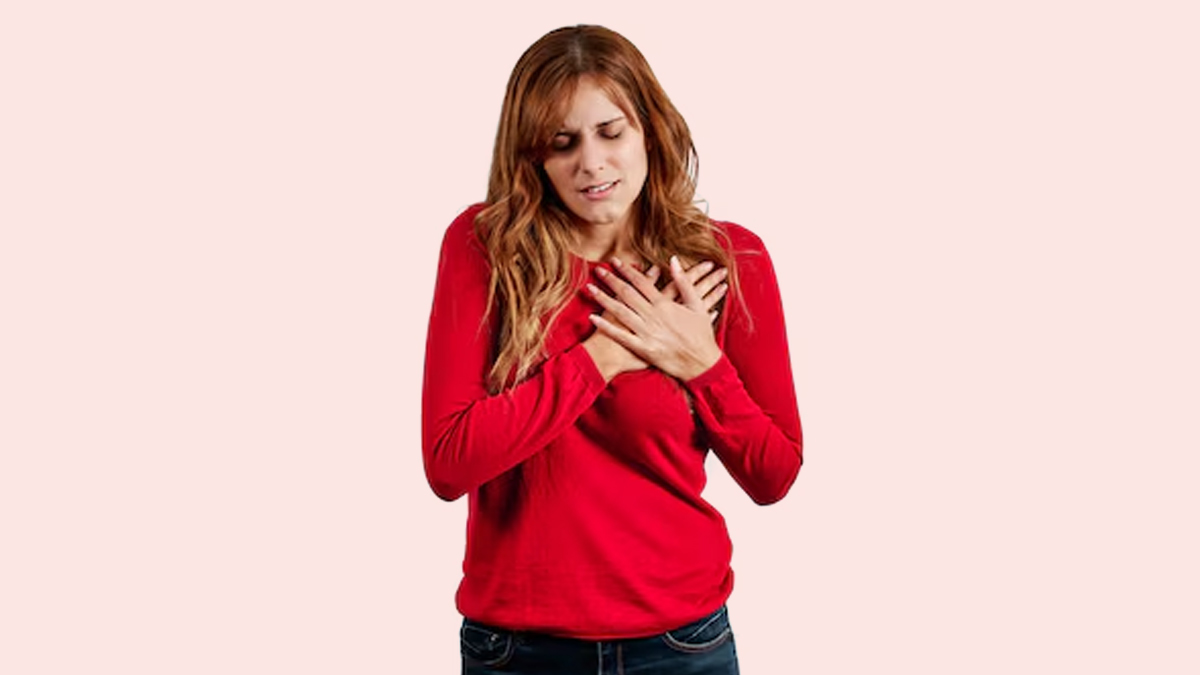
Heart attacks are often associated with men having dramatic chest pain and sudden collapses, thanks to the way they are portrayed in movies. But in reality, heart attack symptoms can be far subtler, primarily in women. These symptoms often go unnoticed or are dismissed as minor ailments, which can have devastating consequences.
Table of Content:-
According to the Global Burden of Disease Study, heart disease is the leading cause of death among women in India, accounting for almost 18% of all female deaths. Despite this alarming statistic, the signs of heart disease in women are frequently misunderstood, underplayed, or ignored entirely.
In a conversation with the OnlyMyHealth team, Dr. Rajat Mohan, Co-Chairperson, Cardiology, Sir Ganga Ram Hospital, New Delhi, highlights the need for awareness and shares five signs of heart attacks in women.
RELATED: How To Manage Heart Health After Bypass Surgery
Are Women Less Prone to Heart Attacks?

Dr. Mohan explains that the disparity in heart disease rates between men and women often comes down to hormones. “Till menopause, women have fewer heart problems. As soon as menopause happens, blood pressure starts increasing in women, and along with it, the possibility of heart problems rises.”
This protective effect is believed to be linked to naturally occurring hormones like oestrogen, which helps maintain healthy blood vessels. However, post-menopause, women’s risk of developing heart disease increases significantly, often matching or surpassing that of men.
Silent Signs of a Heart Attack in Women
Unlike the classic symptom of severe chest pain that men experience, women may exhibit more subtle signs of a heart attack. Here are five silent signs that women and their families should be aware of.
1. Breathing Problems
Shortness of breath is one of the most common symptoms reported by women experiencing a heart attack. Surprisingly, it often occurs without chest pain. Dr. Mohan points out, “Sometimes, women deny having chest pain, but they mention significant breathing problems, even after mild exertion like walking or climbing stairs. This breathing problem is not easy to ignore.”
2. Unusual Fatigue and Sleep Disturbances
Extreme tiredness, particularly if it is out of the ordinary or unconnected to physical exertion, can signal a heart problem. Women might also experience difficulty sleeping, which could be an early warning sign. Research funded by the British Heart Foundation corroborates the same.
3. Discomfort Behind the Breastbone
Instead of sharp pain, women might feel a sense of heaviness, tightness, or pressure behind the breastbone. This discomfort can often be mistaken for indigestion, nausea, or anxiety.
4. Pain Radiating to the Shoulder, Jaw, or Arm
Dr. Mohan notes that pain from a heart attack may not be confined to the chest. It can radiate to the shoulder, jaw, or inner aspect of the arm, making it harder to recognise as a heart-related issue.
5. Sweating and Dizziness
Cold sweats, clammy skin, dizziness, and lightheadedness are all symptoms that women often dismiss as being unrelated to heart problems. However, these signs can indicate a serious issue, especially when combined with other symptoms and risk factors.
Why Are Heart Attacks Not Prominently Diagnosed in Women?

Dr. Mohan says, “If you visit any coronary care unit, you will see that if, supposedly, there are 10 beds, then you’ll see that among those admitted, there will be approximately 8-9 men and only 1-2 women. This should nudge us to think about why it is that women demonstrate fewer heart problems as compared to men.”
With that being said, studies reveal that women wait significantly longer than men before seeking treatment for a heart attack. While men seek help within a median of 16 hours, women wait for approximately 54 hours. This delay can have life-threatening consequences.
Several factors contribute to this hesitation;
- Women may attribute their symptoms to less serious issues, such as stress or indigestion. This also leads to misdiagnosis.
- A lack of awareness about the atypical presentation of heart attacks in women can lead to underestimation of the problem.
- Societal expectations for women to prioritise others over themselves can result in neglecting their own health.
Another contributing factor is attributed to women being given less effective treatments, as per the British Heart Foundation, owing to a common perception of how subtle signs do not imply anything serious.
RELATED: From Heart Health to Cancer Prevention: The Power of Eating 5 Mushrooms Daily, According To A Study
What Can Women Do to Protect Their Heart Health and Channelise the Right Diagnosis?
- Monitor your blood pressure, cholesterol levels, and overall heart health, especially after menopause.
- Avoid smoking, reduce stress, eat a balanced diet, and exercise regularly.
- Pay attention to changes in your health and don’t dismiss unusual symptoms.
- If you suspect a heart attack or even something remotely close to it, seek immediate medical attention. Remember, every second counts.
Stay Vigilant
Heart disease in women is a silent killer, often creeping up unnoticed until it’s too late. By understanding the unique symptoms women face and acting promptly, lives can be saved. Better education about women-specific symptoms is essential in reducing the delay in treatment and saving lives.
Dr. Mohan emphasises the importance of recognising and acting on these subtle symptoms. “Heart problems in women do not always present with severe chest pain. Breathing problems, extreme fatigue, or even discomfort behind the breastbone can indicate serious issues. Women need to take these symptoms seriously and seek medical help immediately.”
Also watch this video
How we keep this article up to date:
We work with experts and keep a close eye on the latest in health and wellness. Whenever there is a new research or helpful information, we update our articles with accurate and useful advice.
Current Version
